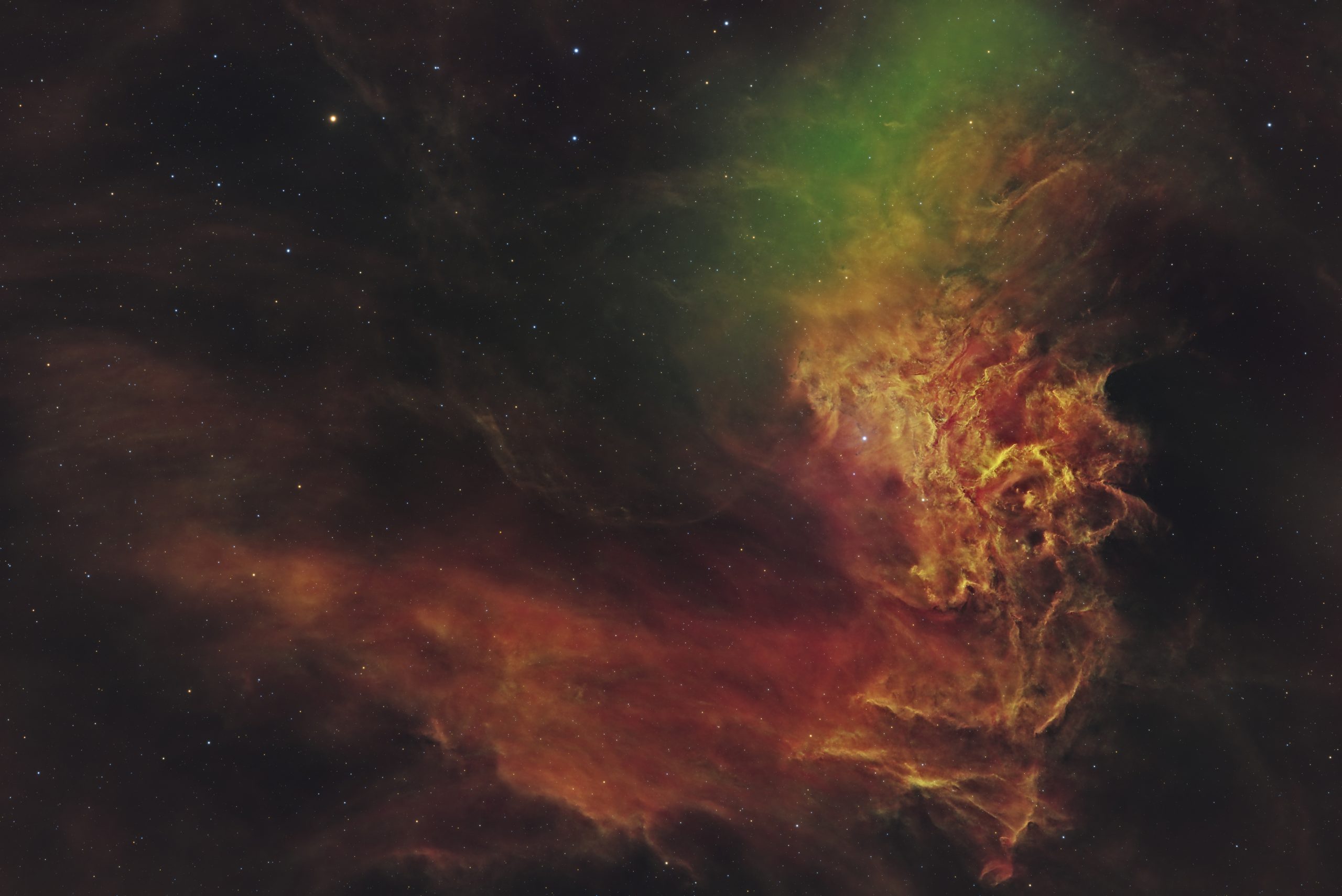Submissions: 2023 January
Re: Submissions: 2023 January
Robin's Egg Nebula - HOORGB Composition
Copyright: Bogdan Borz
Telescope : ASA AZ1000 1m RC
Camera : FLI PL16803
Astrodon filters Ha, OIII, RGB
Location: ChileScope, Coquimbo Region, Chile
Five nights between September 09 - October 30 2022
R 7 x 300s
G 6 x 300s
B 7 x 300s
Ha 14 x 600s
OIII 14 x 600s
Full and details : https://www.astrobin.com/full/0pqzge/C/?mod=&real=
Copyright: Bogdan Borz
Telescope : ASA AZ1000 1m RC
Camera : FLI PL16803
Astrodon filters Ha, OIII, RGB
Location: ChileScope, Coquimbo Region, Chile
Five nights between September 09 - October 30 2022
R 7 x 300s
G 6 x 300s
B 7 x 300s
Ha 14 x 600s
OIII 14 x 600s
Full and details : https://www.astrobin.com/full/0pqzge/C/?mod=&real=
-
mpshetzer
Re: Submissions: 2023 January
Orion Nebula in LRGB

Details at:https://www.shetzers.com/orion-nebula-and-running-man/
Clear Skies,
Matt Shetzer

Details at:https://www.shetzers.com/orion-nebula-and-running-man/
Clear Skies,
Matt Shetzer
-
mpshetzer
Re: Submissions: 2023 January
Horsehead Nebula in LRGB with Ha added.

Details at https://www.shetzers.com/horsehead-nebula/
Clear Skies,
Matt Shetzer

Details at https://www.shetzers.com/horsehead-nebula/
Clear Skies,
Matt Shetzer
-
mpshetzer
Re: Submissions: 2023 January
Veil Nebula in HOO

Details at: https://www.shetzers.com/veil-nebula-ngc-6960/
Clear Skies,
Matt Shetzer

Details at: https://www.shetzers.com/veil-nebula-ngc-6960/
Clear Skies,
Matt Shetzer
-
mpshetzer
Re: Submissions: 2023 January
Horsehead Nebual in Black and White with Ha Only

Details @ https://www.shetzers.com/horsehead-nebu ... d-white-2/
Clear Skies,
Matt Shetzer

Details @ https://www.shetzers.com/horsehead-nebu ... d-white-2/
Clear Skies,
Matt Shetzer
Re: Submissions: 2023 January
sh2-108/IC1318/LBN238 (c-sho)
Also includes NGC6910.
Total integration: 1942 minutes/32.4 hours (98 x 300s or 11.43h for Ha + 96 x 300s or 11.20h for O3 + 84 x 300s or 9.80h for S2).
Cameras: QHY294M (11mp mono) CMOS cooled to -15 degrees C.
Telescopes: Stellarvue SV70T triplet apochromat refractor @ f/4.8.
Reducers: SFFR70-APO (0.8x).
Mount: Paramount MyT.
Filters: 1.25" Astrodon 5nm Ha, 3nm O3, and 3nm S2.
Software: TheSkyX Pro, SharpCap, PixInsight, Topaz Studio 2.
Inline images with reduced quality uploaded to the forum. Full resolution images of different versions are available at https://www.astrobin.com/nm6fwk/ and of the main image at http://ram.org/images/space/scope/1.4.4 ... 2m_33h.jpg
As always, thanks for looking!
--Ram
Also includes NGC6910.
Total integration: 1942 minutes/32.4 hours (98 x 300s or 11.43h for Ha + 96 x 300s or 11.20h for O3 + 84 x 300s or 9.80h for S2).
Cameras: QHY294M (11mp mono) CMOS cooled to -15 degrees C.
Telescopes: Stellarvue SV70T triplet apochromat refractor @ f/4.8.
Reducers: SFFR70-APO (0.8x).
Mount: Paramount MyT.
Filters: 1.25" Astrodon 5nm Ha, 3nm O3, and 3nm S2.
Software: TheSkyX Pro, SharpCap, PixInsight, Topaz Studio 2.
Inline images with reduced quality uploaded to the forum. Full resolution images of different versions are available at https://www.astrobin.com/nm6fwk/ and of the main image at http://ram.org/images/space/scope/1.4.4 ... 2m_33h.jpg
As always, thanks for looking!
--Ram
-
barretosmed
- Science Officer
- Posts: 482
- Joined: Thu Oct 12, 2017 6:04 pm
Re: Submissions: 2023 January
MOON IN MINERAL COLORS
MORE DETAILS
https://www.astrobin.com/full/gfkg3q/0/
I was saving this image for a special moment, so I decided to post it here, for me it was my best moon image of last year.
The Moon is usually seen in subtle shades of gray or yellow
The different colors are recognized to correspond to real differences in the chemical composition of the lunar surface.
The blue tones reveal areas rich in ilmenite, which contains iron, titanium and oxygen, mainly titanium, while the orange and purple colors show regions relatively poor in titanium and iron. The white / gray tones refer to areas of greater exposure to sunlight.
Moon trips have already been guided through similar images.
EQUIPMENTS:
ZWO ASI 6200MC COLED
Esprit 150mm
Baader Moon Filter
Date: 12/31/2022
Time: 21:00
Location: Munhoz - MG - Brazil
Author: Fernando Oliveira de Menezes
EMail: Barretosmed@hotmail.com
(Organizing author of the book Amateur Astrophotography in Brazil)
https://clubedeautores.com.br/livro/ast ... -no-brasil
PROCESSING AND CAPTURE:
Software: Adobe Photoshop, SharpCap, AutoStakkert AutoStackert and Registax 6.Copyright: Your name
MORE DETAILS
https://www.astrobin.com/full/gfkg3q/0/
I was saving this image for a special moment, so I decided to post it here, for me it was my best moon image of last year.
The Moon is usually seen in subtle shades of gray or yellow
The different colors are recognized to correspond to real differences in the chemical composition of the lunar surface.
The blue tones reveal areas rich in ilmenite, which contains iron, titanium and oxygen, mainly titanium, while the orange and purple colors show regions relatively poor in titanium and iron. The white / gray tones refer to areas of greater exposure to sunlight.
Moon trips have already been guided through similar images.
EQUIPMENTS:
ZWO ASI 6200MC COLED
Esprit 150mm
Baader Moon Filter
Date: 12/31/2022
Time: 21:00
Location: Munhoz - MG - Brazil
Author: Fernando Oliveira de Menezes
EMail: Barretosmed@hotmail.com
(Organizing author of the book Amateur Astrophotography in Brazil)
https://clubedeautores.com.br/livro/ast ... -no-brasil
PROCESSING AND CAPTURE:
Software: Adobe Photoshop, SharpCap, AutoStakkert AutoStackert and Registax 6.Copyright: Your name
Re: Submissions: 2023 January
The Pleiades
Here is a picture I photographed of the Seven Sisters also known as the Pleiades
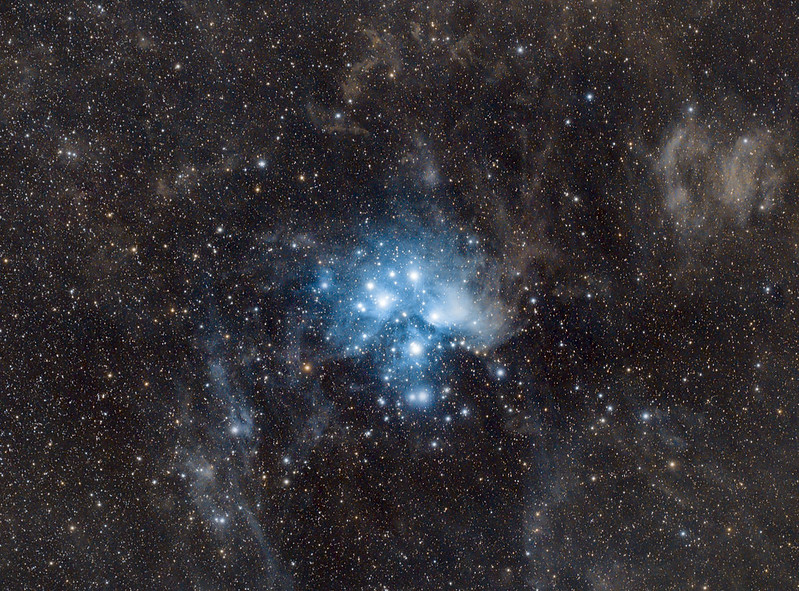
Pléiades by Martin Giraud
Social : https://www.instagram.com/tinmar_g/
I shot this pic during an astrophotography session at the Cosmodrome Observatory in south of France. The observatory is perched at the top of the mountain at 1400m, and this night was quite cold. The temperature was -2°c but the feeling was -7°c because of the wind. In those conditions it’s not alway easy to do things well.
So for the final picture is a stack of 158 pictures. Where each picture has the following settings :
50secs - ISO3200 - f4.9
Equipment :
Redcat 51 - Star Adventurer - Canon 6D
Here is a picture I photographed of the Seven Sisters also known as the Pleiades

Pléiades by Martin Giraud
Social : https://www.instagram.com/tinmar_g/
I shot this pic during an astrophotography session at the Cosmodrome Observatory in south of France. The observatory is perched at the top of the mountain at 1400m, and this night was quite cold. The temperature was -2°c but the feeling was -7°c because of the wind. In those conditions it’s not alway easy to do things well.
So for the final picture is a stack of 158 pictures. Where each picture has the following settings :
50secs - ISO3200 - f4.9
Equipment :
Redcat 51 - Star Adventurer - Canon 6D
-
astrohokie
- Ensign
- Posts: 36
- Joined: Thu Oct 14, 2021 10:32 pm
Re: Submissions: 2023 January
First Full Moon (Mineral) of 2023
https://www.flickr.com/photos/194543639@N07/
https://www.instagram.com/mark_hoffman_photography/
Copyright: Mark Hoffman
 by mark h, on Flickr
by mark h, on Flickr
Equipment/Capture Details:
Celestron Edge HD8 w/ 0.7x reducer
EQ6R-Pro
Celestron Autofocuser
ASI 294MM Pro Bin 2
ASI 7 position EFW
1.25in Chroma RGB filters
Virginia, USA
Bortle 7
3.6ms exposure
121 gain
30 offset
Seeing was below average. Moon altitude ~+76 degrees. 1000 frames per filter. Frames aligned in PIPP with best 25% kept. Stacked in AS3, 5% of frames kept. Wavelets in RS6. Aligned channels in PS, saved as TIF. RGB align and balance in RS6. PS camera raw filter for exposure, contract, saturation, and luminance.
https://www.flickr.com/photos/194543639@N07/
https://www.instagram.com/mark_hoffman_photography/
Copyright: Mark Hoffman
 by mark h, on Flickr
by mark h, on FlickrEquipment/Capture Details:
Celestron Edge HD8 w/ 0.7x reducer
EQ6R-Pro
Celestron Autofocuser
ASI 294MM Pro Bin 2
ASI 7 position EFW
1.25in Chroma RGB filters
Virginia, USA
Bortle 7
3.6ms exposure
121 gain
30 offset
Seeing was below average. Moon altitude ~+76 degrees. 1000 frames per filter. Frames aligned in PIPP with best 25% kept. Stacked in AS3, 5% of frames kept. Wavelets in RS6. Aligned channels in PS, saved as TIF. RGB align and balance in RS6. PS camera raw filter for exposure, contract, saturation, and luminance.
-
michele.gz
- Ensign
- Posts: 13
- Joined: Fri Sep 27, 2013 10:28 am
Re: Submissions: 2023 January
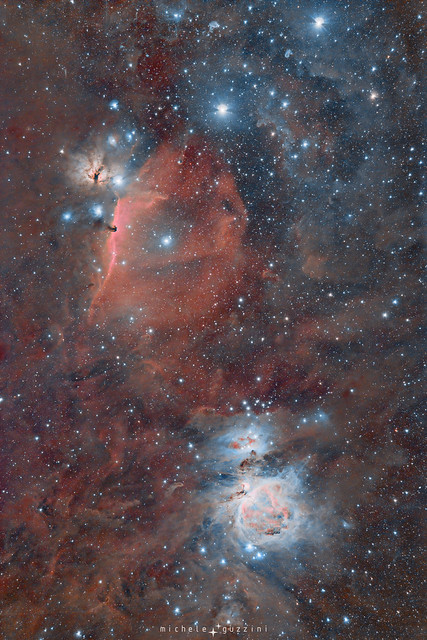 Orion Nebula Complex by Michele Guzzini, su Flickr
Orion Nebula Complex by Michele Guzzini, su FlickrNikon Z6 + Nikon AF-S 300mm F/2.8 IF-ED + Astronomik UHC-E
114x90" + 1x20" F/2.8 ISO 800
Monti Sibillini - Italy
-
Herbert_Walter
- Ensign
- Posts: 18
- Joined: Sat Nov 05, 2022 2:56 pm
Re: Submissions: 2023 January
Jewels in the southern sky!
This photo shows one of the most beautiful open star clusters of the southern sky - NGC 4755.
It is an extremely brilliant and famous object when viewed through a binocular or a telescope. The orange star is DU Crucis and a red supergiant, strongly contrasting with the other bright members which are blue supergiants.
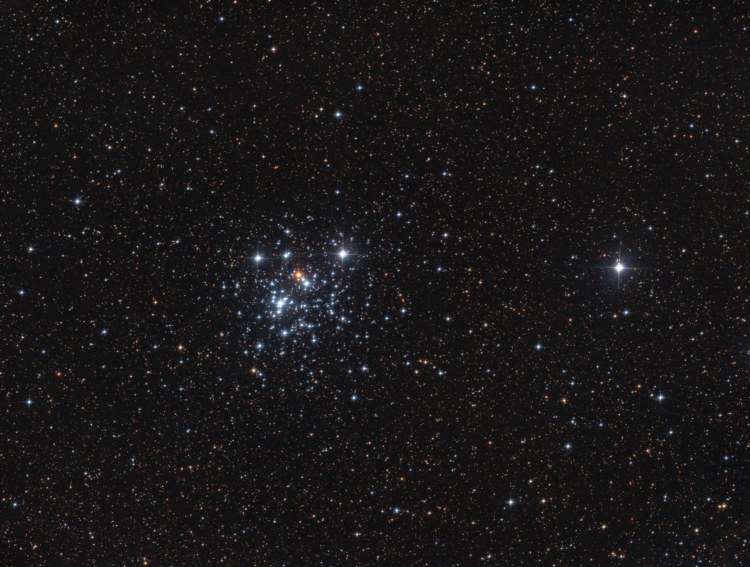
More info: https://www.skypixels.at/ngc4755_info.html
This photo shows one of the most beautiful open star clusters of the southern sky - NGC 4755.
It is an extremely brilliant and famous object when viewed through a binocular or a telescope. The orange star is DU Crucis and a red supergiant, strongly contrasting with the other bright members which are blue supergiants.
More info: https://www.skypixels.at/ngc4755_info.html
Re: Submissions: 2023 January
Solar corona from New York, December 10, 2022
While we wait impatiently for the 2024 total solar eclipse and others around the world, we can view and image the solar corona by making our own eclipses. The attached coronal image was taken on December 10, 2022 in New York State using a 50mm homemade coronagraph, a 5303 Angstrom filter that shows Fe XIV light from the E-corona, and an ASI1600MM Pro camera. It was a relatively quiet day on the circumference of the Sun, allowing the exposure to focus on the dimmer parts of the corona that surround the Sun, with its beautiful streamers and loops. This image was created from a pair of 30-second videos, one taken with the filter at its operating temperature and one 20C cooler (thus eliminating the corona). This process minimized the fringing and circular reflections inherent in the filter.
Copyright: George Hripcsak
While we wait impatiently for the 2024 total solar eclipse and others around the world, we can view and image the solar corona by making our own eclipses. The attached coronal image was taken on December 10, 2022 in New York State using a 50mm homemade coronagraph, a 5303 Angstrom filter that shows Fe XIV light from the E-corona, and an ASI1600MM Pro camera. It was a relatively quiet day on the circumference of the Sun, allowing the exposure to focus on the dimmer parts of the corona that surround the Sun, with its beautiful streamers and loops. This image was created from a pair of 30-second videos, one taken with the filter at its operating temperature and one 20C cooler (thus eliminating the corona). This process minimized the fringing and circular reflections inherent in the filter.
Copyright: George Hripcsak
-
astrohokie
- Ensign
- Posts: 36
- Joined: Thu Oct 14, 2021 10:32 pm
Re: Submissions: 2023 January
Jan 2023 Mineral Moon Mosaic Apollo Landings
https://www.flickr.com/photos/194543639@N07/
https://www.instagram.com/mark_hoffman_photography/
Copyright: Mark Hoffman
 by mark h, on Flickr
by mark h, on Flickr
EQ6R-PRO
Explore Scientific ED102
ASI 224MC
ASI EAF
TeleVue 2" 2x Powermate
Televue 2" and 3.5" Extensions
Pegasus Pocket Powerbox
2" Astronomik UV/IR filter
24 panel mosaic using Moon Panorama Maker and Firecapture. 2000 frames per panel, 2.559ms exposure, gain 123. Processed with PIPP, AS3, RS6, Pixinsight, and Photoshop.
https://live.staticflickr.com/65535/526 ... db10_h.jpg
https://www.flickr.com/photos/194543639@N07/
https://www.instagram.com/mark_hoffman_photography/
Copyright: Mark Hoffman
 by mark h, on Flickr
by mark h, on FlickrEQ6R-PRO
Explore Scientific ED102
ASI 224MC
ASI EAF
TeleVue 2" 2x Powermate
Televue 2" and 3.5" Extensions
Pegasus Pocket Powerbox
2" Astronomik UV/IR filter
24 panel mosaic using Moon Panorama Maker and Firecapture. 2000 frames per panel, 2.559ms exposure, gain 123. Processed with PIPP, AS3, RS6, Pixinsight, and Photoshop.
https://live.staticflickr.com/65535/526 ... db10_h.jpg
Last edited by bystander on Sun Jan 08, 2023 5:27 am, edited 1 time in total.
Reason: Please, no hot links to images > 500 kb. Substituted smaller image.
Reason: Please, no hot links to images > 500 kb. Substituted smaller image.
-
varadinagypal
- Ensign
- Posts: 82
- Joined: Fri Dec 20, 2013 9:29 pm
Re: Submissions: 2023 January
The Black Sun
I imaged the Sun in the narrow band of Calcium K. To obtain this picture, I used the photo output, of which I subtracted the median of it -- in essence, the limb and its darkening -- and the result is the brighter-than-their context regions. The differential rotation of the Sun becomes more than obvious, as the active regions appear almost similar to Jupiter's cloud bands, and why not, Earth's clouds.
https://csillagtura.ro/a-black-sun-on-2023-01-06-in-cak
Copyright: Pál VÁRADI NAGY
Instruments: EQ3-mod, mountpusher autoguider, Sharpstar 60/330 ED-APO, Lunt CaK B600 LS6CAKMDS2, ASI 178MM (cooled)
The middle of the session: 2023-01-06T12:52:00Z, 4x 4'33" of data
I imaged the Sun in the narrow band of Calcium K. To obtain this picture, I used the photo output, of which I subtracted the median of it -- in essence, the limb and its darkening -- and the result is the brighter-than-their context regions. The differential rotation of the Sun becomes more than obvious, as the active regions appear almost similar to Jupiter's cloud bands, and why not, Earth's clouds.
https://csillagtura.ro/a-black-sun-on-2023-01-06-in-cak
Copyright: Pál VÁRADI NAGY
Instruments: EQ3-mod, mountpusher autoguider, Sharpstar 60/330 ED-APO, Lunt CaK B600 LS6CAKMDS2, ASI 178MM (cooled)
The middle of the session: 2023-01-06T12:52:00Z, 4x 4'33" of data
Re: Submissions: 2023 January
Comparto mi ultima fotografía realizada el pasado día 1 de Agosto desde la sierra de Benamahoma (Cádiz), es la primera foto que hago con la QHY 168c desde un cielo medio decente y estoy encantado con la camarita, espero que os guste.
Equipo utilizado:
- Telescopio: Takahashi FSQ85
- Cámara principal: Qhy 168C
- Montura: Neq 6 pro.
- Sistema de guiado lunático.
- Procesado con Pixinsight 1.8
Datos:
- 33 lights 480", -10 grados, 5 gain, 72 offset
- Darks, flats y dark flats
- Filtro idas lps P2
 LDN 1235 NUEVA by ivan izquierdo bernal, en Flickr
LDN 1235 NUEVA by ivan izquierdo bernal, en Flickr
Equipo utilizado:
- Telescopio: Takahashi FSQ85
- Cámara principal: Qhy 168C
- Montura: Neq 6 pro.
- Sistema de guiado lunático.
- Procesado con Pixinsight 1.8
Datos:
- 33 lights 480", -10 grados, 5 gain, 72 offset
- Darks, flats y dark flats
- Filtro idas lps P2
 LDN 1235 NUEVA by ivan izquierdo bernal, en Flickr
LDN 1235 NUEVA by ivan izquierdo bernal, en Flickr-
varadinagypal
- Ensign
- Posts: 82
- Joined: Fri Dec 20, 2013 9:29 pm
Re: Submissions: 2023 January
The Craft Named Sunshine
https://csillagtura.ro/sunshine-with-a- ... 023-01-06/
Copyright: Pál VÁRADI NAGY
While observing the Sun, I didn't even notice the plane crossing -- only that the stack got ruined. For the attached picture, I used one single ~5ms exposure of the Sun with the plane, and a 4'33 (yes, intentionally 4'33") pristine stack of the Sun, hence, between the original frame, of which only the plane remains, and the stack, the prominences have moved/changed.
EQ3-mod, mountpusher autoguider, Lunt LS60T Ha B600, ASI 178MM (cooled) https://www.youtube.com/watch?v=-uLCPdw1lkI
https://csillagtura.ro/sunshine-with-a- ... 023-01-06/
Copyright: Pál VÁRADI NAGY
While observing the Sun, I didn't even notice the plane crossing -- only that the stack got ruined. For the attached picture, I used one single ~5ms exposure of the Sun with the plane, and a 4'33 (yes, intentionally 4'33") pristine stack of the Sun, hence, between the original frame, of which only the plane remains, and the stack, the prominences have moved/changed.
EQ3-mod, mountpusher autoguider, Lunt LS60T Ha B600, ASI 178MM (cooled) https://www.youtube.com/watch?v=-uLCPdw1lkI
-
astrosirius
- Science Officer
- Posts: 117
- Joined: Fri Nov 23, 2012 11:17 am
- Location: Barcelona Spain
- Contact:
Re: Submissions: 2023 January
Comet C/2022 E3 (ZTF)
Comet C/2022 E3 (ZTF) is currently in the constellation of Corona Borealis.
Movie generated from 84 images of 60 seconds at resolution at 0.30”/px. Taken by an telescope RC16” & one-shot color camera. Movie processed with and specific astronomical software.
http://astrotolva.com/
Copyright: Lluís Romero
Comet C/2022 E3 (ZTF) is currently in the constellation of Corona Borealis.
Movie generated from 84 images of 60 seconds at resolution at 0.30”/px. Taken by an telescope RC16” & one-shot color camera. Movie processed with and specific astronomical software.
http://astrotolva.com/
Copyright: Lluís Romero
Click to play embedded YouTube video.
Last edited by bystander on Mon Jan 09, 2023 5:19 pm, edited 1 time in total.
Reason: <img> tags require an image url. <youtube> requires the full url, not the abbreviated url
Reason: <img> tags require an image url. <youtube> requires the full url, not the abbreviated url
Lluís Romero Ventura
http://astrotolva.com/
http://astrotolva.com/
- the_astronomy_enthusiast
- Ensign
- Posts: 98
- Joined: Fri Apr 16, 2021 10:16 pm
- Contact:
Re: Submissions: 2023 January
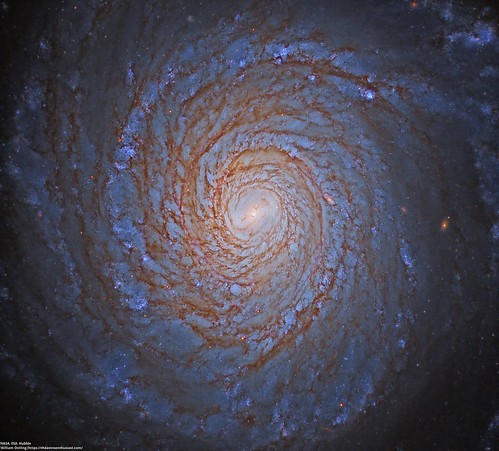
Spiral Galaxy NGC 3147 from Hubble by William Ostling, on Flickr
Full write-up here: https://theastroenthusiast.com/spiral-g ... om-hubble/
The graceful, winding arms of the majestic spiral galaxy NGC 3147 appear like a grand spiral staircase sweeping through space in this Hubble Space Telescope image. They are actually long lanes of young blue stars, pinkish nebulas, and dust in silhouette.
The beauty of the galaxy belies the fact that at its very center is a malnourished black hole surrounded by a thin, compact disk of stars, gas, and dust that have been caught up in a gravitational maelstrom. The black hole’s gravity is so intense that anything that ventures near it gets swept up in the disk.
The disk is so deeply embedded in the black hole’s intense gravitational field that the light from the gas disk is modified, according to Einstein’s theories of relativity, giving astronomers a unique peek at the dynamic processes close to a black hole.
NGC 3147 is located 130 million light-years away in the northern circumpolar constellation Draco the Dragon.
Website: https://theastroenthusiast.com/
Instagram: https://www.instagram.com/the_astronomy_enthusiast/
-
tommasostella
- Ensign
- Posts: 60
- Joined: Mon Nov 11, 2019 4:34 pm
Re: Submissions: 2023 January
The Fish Head nebula in Hubble palette (IC 1795, NGC 896)
web:https://www.facebook.com/tommaso.m.stella
Copyright: Tommaso Stella
From: Taranto-Italy
Sky: SQM 20,45
Lights: 83x300s Ha(3nm) + 80x300s OIII(3nm), 88x300s SII(3nm)
Telescope: Skywatcher Quattro 250P + GPU Coma corrector
Camera: QHY 294M Pro
Mount: Skywatcher AZ-EQ6 GT
Filters: Optolong SHO 3nm
Processing: DeepSkyStacker, Photoshop CC, PixInsight
web:https://www.facebook.com/tommaso.m.stella
Copyright: Tommaso Stella
From: Taranto-Italy
Sky: SQM 20,45
Lights: 83x300s Ha(3nm) + 80x300s OIII(3nm), 88x300s SII(3nm)
Telescope: Skywatcher Quattro 250P + GPU Coma corrector
Camera: QHY 294M Pro
Mount: Skywatcher AZ-EQ6 GT
Filters: Optolong SHO 3nm
Processing: DeepSkyStacker, Photoshop CC, PixInsight
Re: Submissions: 2023 January
Winter Milkyway Panorama Arch over Al Monfareda Mountain.
Image is a composite of the Winter Milkyway over Al Monfareda Mountain. Al Monfareda means the one or only one being a single mountain near Valley of Whales in Fayoum desert.
Category ( Panorama - Tracked - Blended)
Story:
I have been dreaming of creating a winter Milkyway panorama since last winter, and I finally was able to do it! Image is a composite where the foreground was shot in December during the Geminids meteor shower, but unfortunately, the sky panorama failed to stitch, so I re-shot the sky pano on the the 27th of December. Will shoot the arch again soon and try to get a 3rd row to make the projected pano more flexible as it wasn't as easy with just 2 rows.
Gear:
Nikon Z6II Astromodified - Nikon Z6II Stock -Nikon Z14-24mm f/2.8 - Nikon 20mm f/1.8 - Astronomik CLS clipin filter - Fornax Ligtrack II
EXIF
Sky: 12 panels x 2 rows - Nikon Z6II - Astromodified - Astronomik CLS Clip-in filter - Nikon Z14-24mm f/2.8 @24mm - 120" - ISO 1600 - f/2.8
Foreground: 11 panels x 3 rows - Z6II - Nikon 20mm f/1.8 - 25" - ISO 800 - f/2.5 (Moonlight)
 WMW Pano AB by Ahmed Waddah, on Flickr
WMW Pano AB by Ahmed Waddah, on Flickr
https://www.astrobin.com/a3oq5y/
Facebook: https://www.facebook.com/waddah.photography
Astrobin: https://www.astrobin.com/users/WolfHeart/
IG: https://www.instagram.com/waddahphotography/
Image is a composite of the Winter Milkyway over Al Monfareda Mountain. Al Monfareda means the one or only one being a single mountain near Valley of Whales in Fayoum desert.
Category ( Panorama - Tracked - Blended)
Story:
I have been dreaming of creating a winter Milkyway panorama since last winter, and I finally was able to do it! Image is a composite where the foreground was shot in December during the Geminids meteor shower, but unfortunately, the sky panorama failed to stitch, so I re-shot the sky pano on the the 27th of December. Will shoot the arch again soon and try to get a 3rd row to make the projected pano more flexible as it wasn't as easy with just 2 rows.
Gear:
Nikon Z6II Astromodified - Nikon Z6II Stock -Nikon Z14-24mm f/2.8 - Nikon 20mm f/1.8 - Astronomik CLS clipin filter - Fornax Ligtrack II
EXIF
Sky: 12 panels x 2 rows - Nikon Z6II - Astromodified - Astronomik CLS Clip-in filter - Nikon Z14-24mm f/2.8 @24mm - 120" - ISO 1600 - f/2.8
Foreground: 11 panels x 3 rows - Z6II - Nikon 20mm f/1.8 - 25" - ISO 800 - f/2.5 (Moonlight)
 WMW Pano AB by Ahmed Waddah, on Flickr
WMW Pano AB by Ahmed Waddah, on Flickrhttps://www.astrobin.com/a3oq5y/
Facebook: https://www.facebook.com/waddah.photography
Astrobin: https://www.astrobin.com/users/WolfHeart/
IG: https://www.instagram.com/waddahphotography/
-
AE-Astrophoto
Re: Submissions: 2023 January
CG30 & CG31 are a cometary globule (CG) located in Pupis within the Gum Nebula. CGs are known as interstellar clouds with comet-like morphology, consisting of compact, dusty, and opaque heads and long, faintly luminous tails (ESO).
Image acquisition information:
Credit: Aygen Erkaslan / Telescope Live
Date: 2022
Location: Chilie
Scope: Planewave CDK 24
Camera: FLI PL9000
300s LRGB (30, 15, 15, 15)
Ha (34) 600s
Integration time : 12H
https://flic.kr/p/2oaMjcU Astrobin link : https://www.astrobin.com/yio19e/
Image acquisition information:
Credit: Aygen Erkaslan / Telescope Live
Date: 2022
Location: Chilie
Scope: Planewave CDK 24
Camera: FLI PL9000
300s LRGB (30, 15, 15, 15)
Ha (34) 600s
Integration time : 12H
https://flic.kr/p/2oaMjcU Astrobin link : https://www.astrobin.com/yio19e/
Last edited by bystander on Tue Jan 10, 2023 9:36 pm, edited 1 time in total.
Reason: all <img> type tags require image urls not page urls
Reason: all <img> type tags require image urls not page urls
- Sergio
- Friendly Neighborhood Astrophotographer
- Posts: 100
- Joined: Mon Aug 29, 2011 5:26 pm
- Location: Buenos Aires, Argentina
- Contact:
Re: Submissions: 2023 January
Messier 46 & NGC 2438
Messier 46 was the first object Charles Messier discovered after he had published the first edition of his list (M1-M45).
He added this one to his catalogue on February 19, 1771, three days after presenting it to the academy, together with three more Messier objects, M47, M48, and M49.
The cluster is very rich, with 150 stars of mag 10-13 and probably a total population of over 500. The brightest of these stars are of spectral type A0, and each about 100 times more luminous than the Sun (the brightest is of apparent magnitude 8.7). This indicates an age of about 300 million years. The members are scattered over an angular diameter of about 27', corresponding to a linear extension of 30 light years at the cluster's distance of 5,400 light years, and are receding from us at 41.4 km/sec, according to Baade. M46 is classified as of Trumpler type II,2,r.
As a special and famous feature which is also obvious in our photograph, a planetary nebula (NGC 2438, also FC 87) appears within the apparent borders of M46. This object appears to lie near the northern fringes of the cluster. However, this nebula is most probably not a true member but is superimposed, or perhaps a passing "guest".
More info at
www.baskies.com.ar
or
www.instagram.com/buenosaires_skies/
Best Regards
Sergio
Messier 46 was the first object Charles Messier discovered after he had published the first edition of his list (M1-M45).
He added this one to his catalogue on February 19, 1771, three days after presenting it to the academy, together with three more Messier objects, M47, M48, and M49.
The cluster is very rich, with 150 stars of mag 10-13 and probably a total population of over 500. The brightest of these stars are of spectral type A0, and each about 100 times more luminous than the Sun (the brightest is of apparent magnitude 8.7). This indicates an age of about 300 million years. The members are scattered over an angular diameter of about 27', corresponding to a linear extension of 30 light years at the cluster's distance of 5,400 light years, and are receding from us at 41.4 km/sec, according to Baade. M46 is classified as of Trumpler type II,2,r.
As a special and famous feature which is also obvious in our photograph, a planetary nebula (NGC 2438, also FC 87) appears within the apparent borders of M46. This object appears to lie near the northern fringes of the cluster. However, this nebula is most probably not a true member but is superimposed, or perhaps a passing "guest".
More info at
www.baskies.com.ar
or
www.instagram.com/buenosaires_skies/
Best Regards
Sergio
-
starsoverbucks
- Ensign
- Posts: 19
- Joined: Sun Jan 01, 2023 2:23 pm
Re: Submissions: 2023 January
The Orion and Running Man Nebula
Telescope: Skywatcher Esprit 100 f/5.5
Zwo ASI2600MM Pro
Exposure: 100 x 4min Ha, 100 x 4min Oiii, 70 x 6min Sii, 30x10s for the core.
Mount: iOptron Cem70
Guiding: ASI290mini, 60mm scope
Filter: Optolong 3nm
Software: APT, DSS, Pixinsight
Sky: Bortle 6
Telescope: Skywatcher Esprit 100 f/5.5
Zwo ASI2600MM Pro
Exposure: 100 x 4min Ha, 100 x 4min Oiii, 70 x 6min Sii, 30x10s for the core.
Mount: iOptron Cem70
Guiding: ASI290mini, 60mm scope
Filter: Optolong 3nm
Software: APT, DSS, Pixinsight
Sky: Bortle 6
- felopaul
- Ensign
- Posts: 97
- Joined: Mon Apr 29, 2013 7:14 pm
- AKA: Felopaul
- Location: Flagey (France)
- Contact:
Re: Submissions: 2023 January
NGC 2239
SHORGB : full size/info : http://www.cielaustral.com/galerie/photo144.html
140 Hrs total frames
done with CDK 610, Moravian C4-16000 on PW L600 mount near Actacama Desert in Chile, El Sauce Observatory
http://www.cielaustral.com
Copyright: Team CielAustral with J.C CANONNE, M. SELBY, G.CHASSAIGNE, N.OUTTERS, P. BERNHARD, D. CHAPLAIN & L. BOURGON
SHORGB : full size/info : http://www.cielaustral.com/galerie/photo144.html
140 Hrs total frames
done with CDK 610, Moravian C4-16000 on PW L600 mount near Actacama Desert in Chile, El Sauce Observatory
http://www.cielaustral.com
Copyright: Team CielAustral with J.C CANONNE, M. SELBY, G.CHASSAIGNE, N.OUTTERS, P. BERNHARD, D. CHAPLAIN & L. BOURGON
-
midnightlightning
- Asternaut
- Posts: 3
- Joined: Tue Oct 11, 2022 9:23 am
Re: Submissions: 2023 January
IC405 - HSO
High Definition Image here : https://drive.google.com/file/d/1Ab_Ofy ... sp=sharing
I captured the data from my drive in Tockwith (England – Bortle 4) over three nights between 14th December 2022 and 02nd January 2023.
The Ha and SII data was captured under poor seeing, guiding was very difficult, and a significant moon - in the case of the SII data the moon was also very close to the target. I therefore expected to have issues with removing the gradient from this data but actually this was relatively small, the 3nm filters did a good job, and not too difficult to remove.
The OIII data was taken on a moonless night with excellent seeing but revealed weak OIII content for this target.
I had intended to process the image as SHO but found the weak OIII resulted in a “red” image which was not what I was after. After a lot of experimenting I arrived at an HSO combination that gave these colours. This is the first deep space image I have produced which includes strong green nebulosity but this is due to the strong SII content of the nebula.
I am pleased with the colour of the stars in the image and although they look similar to RGB stars they are from the same Narrow Band data – I processed the stars as SHO, which gave better colour than HSO, and then merged them back into the image.
This image makes a superb full size poster print.
Details
• Scope : CFF 135mm/926mm Refractor
• Camera : QHY600L Mono
• Filters : Chroma 3nm
• Subs:
o Ha – 20 x 600s
o OIII – 18 x 600s
o SII – 26 x 600s
High Definition Image here : https://drive.google.com/file/d/1Ab_Ofy ... sp=sharing
I captured the data from my drive in Tockwith (England – Bortle 4) over three nights between 14th December 2022 and 02nd January 2023.
The Ha and SII data was captured under poor seeing, guiding was very difficult, and a significant moon - in the case of the SII data the moon was also very close to the target. I therefore expected to have issues with removing the gradient from this data but actually this was relatively small, the 3nm filters did a good job, and not too difficult to remove.
The OIII data was taken on a moonless night with excellent seeing but revealed weak OIII content for this target.
I had intended to process the image as SHO but found the weak OIII resulted in a “red” image which was not what I was after. After a lot of experimenting I arrived at an HSO combination that gave these colours. This is the first deep space image I have produced which includes strong green nebulosity but this is due to the strong SII content of the nebula.
I am pleased with the colour of the stars in the image and although they look similar to RGB stars they are from the same Narrow Band data – I processed the stars as SHO, which gave better colour than HSO, and then merged them back into the image.
This image makes a superb full size poster print.
Details
• Scope : CFF 135mm/926mm Refractor
• Camera : QHY600L Mono
• Filters : Chroma 3nm
• Subs:
o Ha – 20 x 600s
o OIII – 18 x 600s
o SII – 26 x 600s



